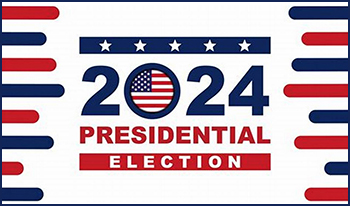By Jim Ellis — Tuesday, July 2, 2024
President
Wisconsin: Marquette Poll Yields Surprising Responses — Marquette University Law School released their quarterly Wisconsin electorate poll (June 12-20; 871 registered Wisconsin voters; live interview) and found some seemingly inconsistent answers particularly relating to former President Donald Trump’s New York conviction.

Marquette poll yields surprising results. (Click here or on image above to see: Marquette University Law School’s released quarterly Wisconsin electorate poll)
On the presidential ballot test question, the registered voter sample broke 50-50 percent between President Joe Biden and former President Donald Trump when undecideds were pushed, and 44-44 percent on the initial question. Among those respondents considering themselves definite or likely voters, Biden held a 51-49 percent edge when respondents were pushed. When the independent and minor party candidates were added to the questionnaire, Trump went ahead 43-40 percent.
Perhaps most noteworthy, in responding to the question regarding Trump’s conviction, by a 54-28 percent margin, independents believe the former president is guilty of the charges. Yet, on the ballot test question, independents still broke for Trump 57-41 percent. This means that many of the Wisconsin respondents who believe Trump was guilty are still willing to vote for him in the general election.
Senate
Montana: Sheehy Leading in Latest Survey — Largely confirming the previously published Emerson College poll, a new survey again shows former President Trump with a huge Montana lead and GOP US Senate candidate Tim Sheehy far behind the top of the ticket but still within a position to win. The Fabrizio Lee & Associates survey (June 3-5; 500 likely Montana general election voters; live interview & text) finds Sheehy pulling ahead of Sen. Jon Tester (D) with a 46-43-4 percent lead. The ballot test included Libertarian candidate Sid Daoud, but not Green Party nominee Robert Barb. Both are expected to be on the general election ballot.
In a straight Tester-Sheehy head-to-head result, the two men are tied at 48 percent apiece, but 41 of Sheehy’s 48 percent say they are definitely voting for him versus only 35 percent of Sen. Tester’s contingent who say likewise.
Former President Trump leads President Biden by a whopping 54-36 percent. The generic question, i.e., “would you be most likely to vote for the Republican candidate or Democratic candidate for senator,” breaks 52-40 percent in favor of the Republican.
Wisconsin: Sen. Baldwin Maintains Lead in Regular Poll — As stated in the presidential section above, the Marquette Law School released their regular quarterly poll of the Wisconsin electorate (June 12-20; 871 registered Wisconsin voters; live interview) and in the Senate race again finds Sen. Tammy Baldwin (D) leading Republican Eric Hovde by a 52-47 percent count when the undecided respondents were prompted to make a choice. On the initial question, Sen. Baldwin led 45-38 percent with 17 percent indicating they are undecided.
House
WI-3: Looming Close Race — The GQR survey research firm went into the field over the June 10-16 period (400 likely WI-3 general election voters; live interview) and finds western Wisconsin Rep. Derrick Van Orden (R-Prairie du Chien) holding only a small lead over small business owner Rebecca Cooke (D). The ballot test favors the freshman congressman by just a 50-46 percent margin. Van Orden’s favorability index, however, is barely positive at 41:40 percent.
Wisconsin’s 3rd District is anchored in the city of La Crosse and spans through all or part of 19 western counties. The FiveThirtyEight data organization rates the seat as R+9, but the Dave’s Redistricting App statisticians calculate a virtually even partisan lean. Former President Trump carried the seat in 2020 with a 51.5 – 46.8 percent victory margin despite losing the statewide count. Prior to Van Orden converting this seat to the Republican column in 2022, Democrat Ron Kind represented the district for 26 years.
VA-5: Rep. Good’s Recount Timetable — Local news reports are confirming that Virginia US Rep. Bob Good (R-Lynchburg) will request and pay for a recount of the June 18 primary results that find him trailing state Sen. John McGuire (R-Manakin Sabot) by 374 votes according to the Virginia Board of Elections official count. The certification deadline is July 2 — today. After certification, a candidate can request a recount.
Though a 374-vote difference is not large — it translates into six tenths of a percentage point from a turnout of 62,792 votes — it is unlikely that a recount will change the final totals by such an amount. Rep. Good is also challenging the handling of ballots in the city of Lynchburg, a locality where the congressman won. Lynchburg election officials say the Good challenge would affect less than 10 ballots, even if his argument is proven correct.






